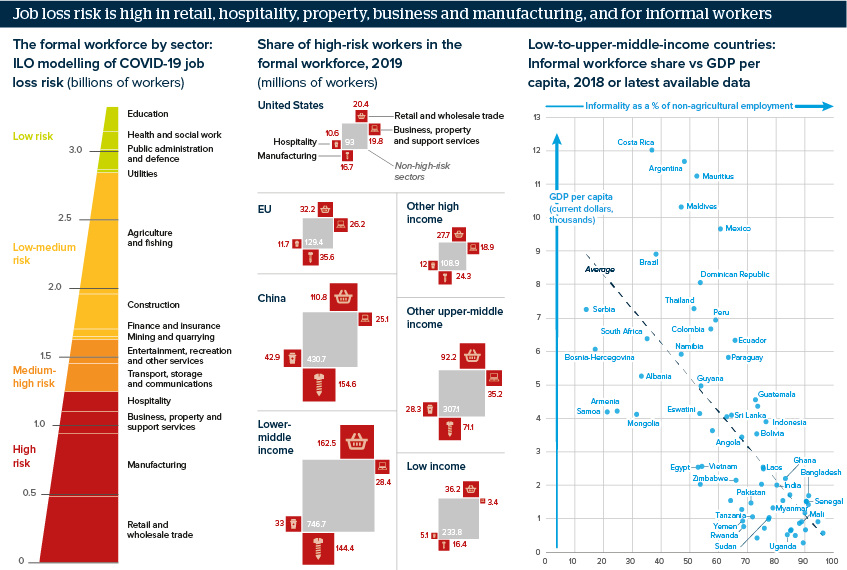The job dislocation of COVID-19 will reduce global GDP
The more jobs that are lost worldwide this year, the more disjointed the economic recovery will initially be
Source: ILO, IMF
Outlook
The shock to demand, supply and finance could cause significant job losses -- on April 7 the ILO estimated 230 million formal full-time job losses. Additionally, part-time workers account for one-fifth or more of many countries’ workforces. Informal workers account for more than half of many developing economy workforces.
Containment measures have locked down around one-third of the world population. Some shutdowns could persist for months, decimating consumption, which accounts for 50-66% of major economies’ GDP.
Countries experiencing deep recession could struggle to maintain political and financial stability as they will have to repay debts at the same time as voters demand pro-growth structural reforms.
Impacts
- The shutdowns expose workers with little social protection, supporting arguments to include them permanently in social security systems.
- Reskilling and re-equipping workers will be key to an economy rebounding and harnessing the opportunities the global recovery will offer.
- Job churn will rise in COVID-19’s wake; in particular, demand will rise for workers with advanced technical, cognitive and social skills.
- COVID-19 will test intergenerational equity as older people face higher health risks, but younger people fear a greater financial impact.
See also
- COVID-induced job market damage will leave large scars - May 4, 2021
- COVID-19 impact will crush developing states' 2020 GDP - Jun 25, 2020
- Pandemic to push sustainability in fashion sector - Jun 24, 2020
- Japan’s industrial dip in June bodes ill for Europe - Jun 23, 2020
- Retail sales will be key to global GDP recovery - Jun 19, 2020
- Prospects for the US economy to end-2020 - Jun 17, 2020
- A second COVID-19 case and lockdown wave would hit GDP - Jun 11, 2020
- Uncertainties over COVID-19 impacts fuel market fears - May 14, 2020
- US job market scarring may hit productivity - May 11, 2020
- Slumping service sectors face an uncertain recovery - May 6, 2020
- Mining supply disruptions mask mounting demand fears - May 5, 2020
- Services PMI damage will exceed the industrial harm - May 4, 2020
- US GDP is on course for a U-shaped drop this year - Apr 30, 2020
- COVID-19 impacts will hit labour-intensive small firms - Apr 30, 2020
- The great GDP contraction may herald huge crowding out - Apr 27, 2020
- Opening sectors will gradually start GDP recovery - Apr 23, 2020
- COVID-19 poses a huge challenge to developing nations - Apr 8, 2020
- More graphic analysis
